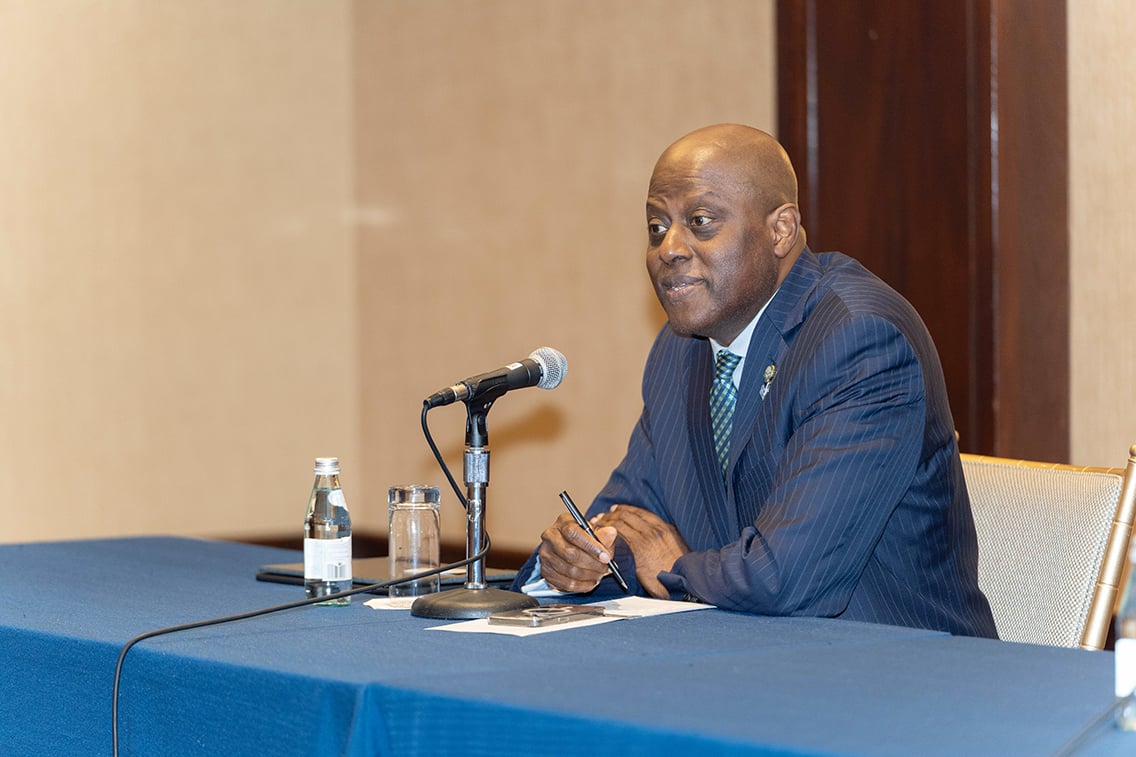
Olayemi Cardoso (above), governor of the Central Bank of Nigeria (CBN), is passionate about two primary goals: taming inflation, which soared to 34.19% in June; and the recapitalisation of banks to enable them to handle big ticket transactions.
While not much has been achieved in reining in inflation, the recapitalisation project seems to be going full speed ahead. Four of Nigeria’s biggest banks are already out of the starting blocks and busy raising funds.
The recapitalisation requires banks to hold minimum capital of N500bn ($311m), N200bn ($125m), and N50bn ($30.8m) for commercial banks with international, national, and regional licences respectively.
The capitalisation baseline for merchant banks was pegged at $30.8m, and for non-interest banks, it is national at $12.3m and regional at $6.15m. Several banks have already approached the domestic capital markets to raise new funds.
Four commercial banks with international licences – Fidelity Bank Plc, Access Holdings Plc, Guaranty Trust Holding Company (GTCO) Plc and FCMB Group Plc – which together need to increase their capital base to $1.23bn, are seeking to raise about $615m in the first phase of intense competition for investors’ funds.
The first cluster of offers came as Cardoso said the recapitalisation will produce resilient and fit-for-purpose banks, better able to withstand economic headwinds and with a greater capacity to grow the economy. Access Holdings’ $216m rights issue is currently ongoing. Access Holdings is offering about 17.773bn ordinary shares of 50 kobo ($0.00031) each to existing shareholders at $0.012 per share.
The rights are pre-allotted on the basis of one new share for every two ordinary shares held as at 7 June and the offer closes on Wednesday, 14 August.
Fidelity Bank had launched a $76.4m hybrid offer including a rights issue of 3.2bn ordinary shares of $0.00030 each at $0.0059 per share, and a public offer of 10bn ordinary shares of $0.00030 each at $0.0059 per share.
The acceptance and application lists for Fidelity Bank’s combined offer, which opened on 20 June, closed on 29 July. The rights issue was pre-allotted on the basis of one new ordinary share for every 10 existing ordinary shares held as at the close of business on 5 January.
In the largest of the fundraising efforts so far, GTCO launched a $240.7m public offer of 9bn ordinary shares of $0.00030 each at $0.027 per share. GTCO, which had secured the approval of the Nigerian Exchange (NGX), had presented the facts behind its offer before it opened to investors.
FCMB Group also secured approval for a $68.4m public offer. The group is offering 15.197bn ordinary shares of $0.00030 each at $0.0045 per share. However, Fidelity Bank and FCMB Group are implementing multi-layered recapitalisation plans that may see the banks coming to the market as many times as needed to meet their capital requirements.
Fidelity Bank is expected to raise more than $76.4m under the ongoing combined offer, given the generally positive investors’ sentiment around the bank. The bank board has already launched a regulatory process that will allow the bank to absorb excess funds in the event of potential oversubscription.
No wriggle room for banks
Under the current recapitalisation process, the CBN is using a distinctive definition of minimum capital being the addition of share capital and share premium, rather than the entirety of shareholders’ funds, used under the 2004 recapitalisation plan. With the distinctive definition, nearly all banks need to raise funds to retain their banking licence.
Trading reports at the Nigerian stock market have shown a surge in insiders’ transactions with most deals concentrated on banking stocks.
Regulatory reports by the Nigerian Exchange showed that two-thirds of companies that reported insider acquisition of shares in mid-July were banks, which accounted for the largest volume and value of such transactions. This was consistent with similar trends in recent weeks. The banks’ shares were mostly being acquired by major shareholders, directors and senior management members and their relatives, who by virtue of their closeness to the banks, are classified as insiders under the extant rules at the capital market.
Jude Chiemeka, NGX’s acting CEO, noted that “right issues are one of the preferred means by which banks would be seeking new capital injection to fulfill the apex bank’s requirement”.
Want to continue reading? Subscribe today.
You've read all your free articles for this month! Subscribe now to enjoy full access to our content.
Digital Monthly
£8.00 / month
Receive full unlimited access to our articles, opinions, podcasts and more.
Digital Yearly
£70.00 / year
Our best value offer - save £26 and gain access to all of our digital content for an entire year!
 Sign in with Google
Sign in with Google 



